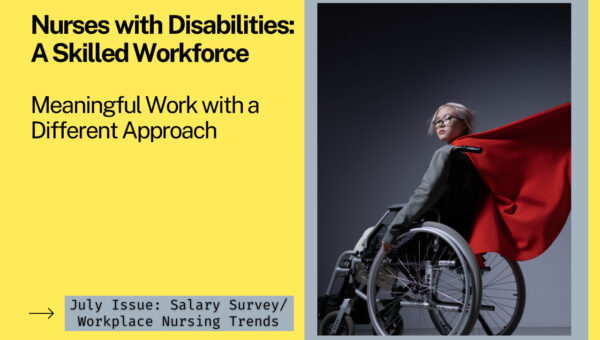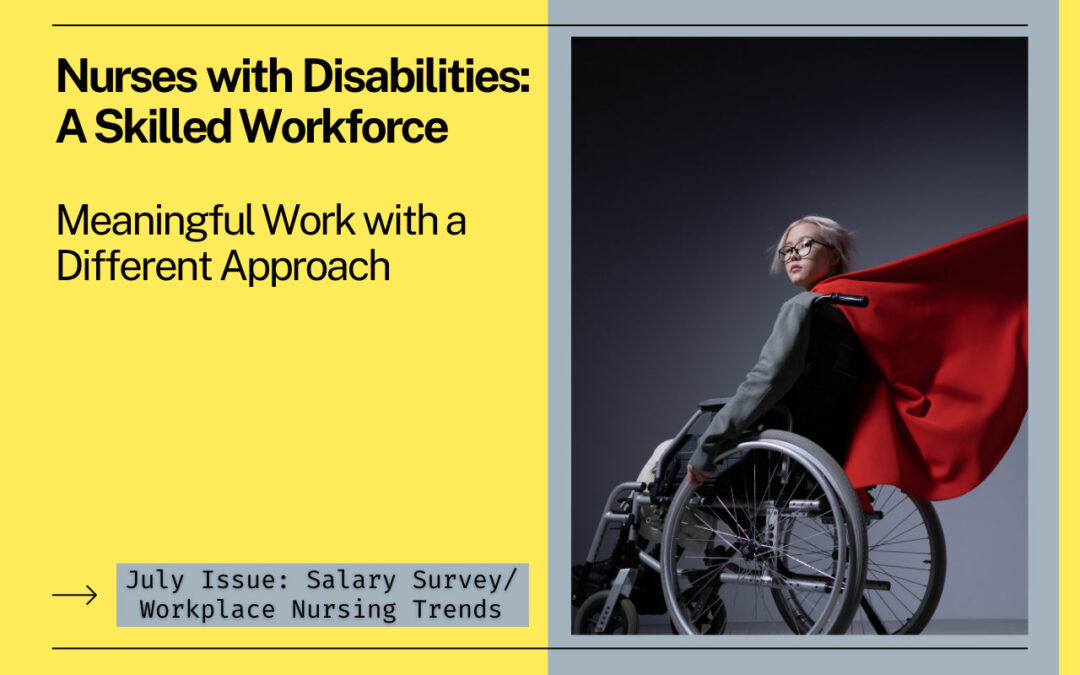Nurses with disabilities find the nursing industry offers excellent career paths that help them fulfill their goals, regardless of disability. Whether nurses have a disability before they enter the workforce or become disabled after their licensure, they are needed to fill jobs and help broaden the diversity of the nursing workforce, says Karen McCulloh RN, BS, co-founder and co-director of the National Organization of Nurses with Disabilities (NOND).
Working with a disability might require accommodations to help you perform your job better or an open approach to different specialties. “Being honest with yourself regarding your strengths and weaknesses will go a long way toward facilitating success,” says Donna C. Maheady, EdD, APRN-BC, founder of ExceptionalNurse.com.
McCulloh, who lost her vision over a 24-hour span, says her nursing skills were enhanced. “We’ve found
that nurses with disabilities have a sense of compassion for patients and what they are going through because they’ve been there,” she says. But for nurses who become disabled while already working as a nurse, McCulloh says there’s often an adjustment phase. “You think about, ‘who am I now? What about my self-esteem, self-identity, self-worth, and self-confidence? Am I still the same person?’”Every Path Is Different
Sandra Nosek, MSN, RN, has been a nurse for over 30 years with experience in management, staff development, QA wound care, long-term critical acute care, hospice, and skilled nursing facilities. She had a hearing aid in her right ear but woke up with sudden bilateral deafness in 2015. “It rocked my world and was very scary,” she says. Navigating without her hearing proved exceedingly challenging.
Nosek thought she’d have surgery and be able to return to work quickly, but her path proved challenging. She obtained her MSN in nursing education (with a 4.0 GPA) in 2019 and, after receiving improved Bluetooth processors in 2021, sent out more than 400 applications with little result.
She landed a job at a skilled nursing facility that restored some of her self-confidence lost in the job search process, and she eventually began working in hospice, a nursing specialty she loves. She recently obtained an RN case manager position with a small hospice in her community. “To other nurses with disabilities, don’t give up,” she says. “Continue to pursue options in your career.”
Kim Hickman, DNP, APRN, Adult PMHNP-BC, works as an adult psychiatric mental health nurse practitioner with the VA Health Care System and has more than 36 years of nursing experience, including in the Army Nurse Corp, as a lieutenant stationed at Walter Reed Army Medical Center (three years on active duty), and roles in medical surgical nursing, home health nursing, occupational health nursing, and volunteer work as a faith community nurse. But Hickman, who has a speech impediment of a stutter/stammer, almost didn’t pursue this career.
“I was unsure if I would be an effective nurse,” she says. “I shared my concerns with my mother, an ICU nurse at the VA then. My mother paused for a few minutes before answering. She looked at me and said, ‘Remember, it’s more important what you say than how you say it.’ Her confidence in me encouraged me to continue pursuing my nursing degree. From that point on, I focused on the content of my speech, making sure the information was accurate and relevant.”
Hickman says her stutter/stammer can fluctuate depending on the situation and her stress level. “Learning to be patient with myself has been a tremendous achievement. I am learning to accept that my stutter/stammer is a part of who I am,” she says, noting that it has positive impacts. “Stutter/stammering has allowed me to actively listen to others, to be patient with others, to be present, and to be compassionate and empathetic toward the suffering of others. It has also helped me recognize and value words’ power and importance. It has given me a chance to pause and decide if I want to say what I intended and time to decide if my comments add value or take away value to the conversation.”
Lois Taurman (who has a nursing degree, national certification as a poison information specialist, a master’s in educational counseling, a jurist doctorate, and also represented the United States as a wheelchair athlete in the Paralympics Games in Seoul) had plans to work in the Navy as a nurse or as a pediatric nurse when a fall from a ladder just before graduation paralyzed her (she can move her arms, but has no finger movement). Taurman, who now works in America’s Poison Centers, a poison specialist in the Kentucky Poison Control Center of Norton Children’s Hospital, says that while she isn’t doing hands-on nursing, her work fulfills her drive to help children.
That doesn’t mean the role was anywhere on Taurman’s radar. “I didn’t know poison center nursing even existed,” she says. “This is a blessing for my career, but also to feel like I have valuable nursing skills.” Her employer has made adjustments and accommodations so Taurman can work, including adaptive technology and spaces. Still, she knows not all nurses have such proactive employers and may feel like they can’t reach their dreams. “Be persistent in looking for jobs,” she advises. “Your skills may differ, but you can show them how to accomplish the job. It may not be how you envisioned it, but it is still possible. Disability isn’t something that should hinder someone.”
PoisonCenters.org is available for all health care professionals to access assistance during a poisoning emergency, and nurses can also find job opportunities there. Always keep the Poison Help number 1-800-222-1222 with you.
Work Options
Nurses must assess their interests and how they work when thinking about a nursing path. Consider the specialties you enjoy working in, determine how fast you can work or prefer, and what accommodations you’ll need to know what’s possible.
According to Maheady, the career options available for nurses with disabilities are very wide and include the following partial list:
- Teaching nursing online
- Parish/faith-based nursing
- Case management
- Quality assurance
- Telephone triage
- Diabetes nurse educator
- Nursing informatics
- Pharmaceutical or insurance company (Nurse Line)
- Legal nurse consultant
- Home health nurse
- Infection control
- Poison control hotline
Technology is changing the options available to nurses with disabilities. Some apps help nurses with color blindness, and assistive technology will read out information for those who can’t see it.
Accommodations
As a nurse with a disability, the Americans with Disabilities Act protects you from having to disclose your disability, but if you need accommodations, then you will need to disclose. Nurses with visible disabilities (such as amputation or paralysis) will likely address their needs earlier in a job search than those with invisible disabilities (such as anxiety or fibromyalgia). Nurses who an organization already employs could become disabled and will need to determine the next steps.
Despite the tendency for some nurses to not want to reveal any disability for fear it could impact their job, Maheady says sometimes that approach backfires. “Undisclosed invisible disabilities can provide a privacy shelter for some nurses,” she says. “However, it may not serve the nurse or institution well.” Colleagues and supervisors might not know about the disability and could make hurtful comments about not looking sick or faking symptoms to struggling nurses.
So, when is a good time? McCulloh says once you have a job offer, you should consider the need for any accommodations. But before that even happens, you’ll want to think about precisely what you’ll need to do the job best. Even the most accommodating human resources department can’t guess your needs, so having a detailed plan will help get you what you need and help human resources make the best plan.
When you have the job offer, approach the topic with your natural enthusiasm for the position, the new opportunity, and the skills you’ll bring. And then relay having a disability and needing specific accommodations to perform the job. Put everything in writing, says Maheady. See this Sample Language for Accommodation Request Letters from JAN – Job Accommodation Network.
Work with HR
The more specific you can be and the more resources and examples you can offer, the better your chances for getting the accommodations you need, says Maheady. “Do you need a sign language interpreter? If so, provide your employer with a list of resources in your community that provide sign language interpreters,” she says. “Offer to start a sign language club for staff to help staff learn basic sign language to work better with you and patients with hearing loss.”
She says that if you need frequent breaks, be specific about how often you need a break and for how long. Suggest to your employer ways you could be covered for breaks specific to your clinical setting/area of practice.
Nurses with mobility issues might need a scooter to navigate long hallways, so they can help their employer by providing resources for purchasing new and used scooters. “Show the cost-benefit of purchasing a scooter compared to the cost of hiring a new nurse or travel nurse for your position,” says Maheady.
Despite awareness around nurses working with disabilities and the protections of the ADA, not all employers are receptive. “If you are met with a negative response, don’t take no for an answer,” says Maheady. “Ask, ‘Who else can I talk to?’ ‘What else can I provide you with to help me be successful?’”
Role Modeling
Nurses with disabilities also reflect the diversity in a patient population and can show people that their life doesn’t stop after a disability. Nurses can share resources with patients and act as important mentors to other nurses. “I can share in an hour what took me ten years to learn,” says McCulloh.
Nurses are needed to help guide policy, and the information is particularly validating to listeners when it comes from a nurse with a disability. “Nurses with disabilities are transforming healthcare and patient care practices,” says McCulloh. “The priority with every nurse is to ensure patient safety. And because of the critical eye toward us, we have direct awareness of that requirement.”
Nosek, who eventually found a role in a specialty that is meaningful to her, says that all nurses must realize that no one is protected from having or developing a disability. “To all nurses, I strongly suggest obtaining some experience in an office-type position at some point in your career to be able to fall back on if you were to become disabled,” she says, noting that her extensive education and management experience wasn’t enough of a buffer to prevent roadblocks in her path to finding a job that would fit her needs.
“There should be more care and compassion by healthcare administrators to ensure healthcare staff can continue to work no matter their disability,” she says, noting industry-wide changes for additional skills training and compassion from health care administration when faced with a nurse’s disability are needed. “I would have gone right back to work had I had the support and training to do another job within nursing,” says Nosek.
Hickman advises nurses to embrace their differences, acknowledge their strengths, work on their weaknesses, and not hide behind a disability. “You are more than your stutter/stammer or any other disability you may have,” she says. “Above all, love, respect, and be patient with yourself and teach others to love, respect, and be patient with you. You truly are unique! You inspire and motivate someone because you have decided to be courageous, present, and speak up!”
Sign up now to get your free digital subscription to Minority Nurse.
- Is the FNP Program Right for You? - April 24, 2024
- WOC Nurses Week Highlights Specialty - April 16, 2024
- Honoring Radiology Nurses Day on April 12 - April 12, 2024



